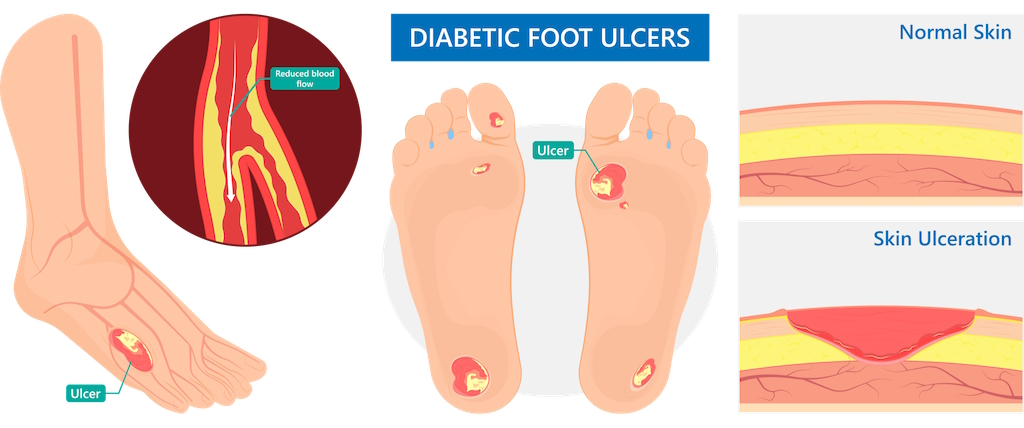Are My Foot Problems Vascular-Related?
Author: StrideCare Internal Team

Nancy* knows to schedule an appointment with her local podiatrist whenever she experiences foot problems. After all, podiatry focuses on matters of the feet, toes, and ankles. But lately, Nancy has been suffering from slow-healing sores on one of her ankles and ongoing feet swelling. And this is all unbeknownst to her podiatrist since she hasn’t sought help in a while. After doing some quick online research, Nancy is beginning to worry that these issues could be vascular-related. Is she right?
The quick answer is there is a good possibility. But it’s important to realize that when you’re experiencing unexplained foot problems, your podiatrist is still a great place to start because of the wound care they provide and the steps they take to lead to an accurate diagnosis for your unique situation. Furthermore, it’s their collaborative approach with vascular doctors that ensures every patient’s issues receive the best treatment possible—whether due to improper footwear or something more serious such as diabetes or peripheral arterial disease (PAD).
What is the cause of your foot problems? Request an appointment with a StrideCare podiatry specialist today. Our collaborative approach ensures you receive the care you need.
Your StrideCare Podiatrist Is Here To Help
Roughly 77% of Americans experience foot problems annually. While the severity of those foot problems can differ widely from person to person, only one-third actually seek help from their podiatrist or primary care physician. The reason is simple: they don’t think it’s significant enough of an issue. In many cases, they chalk them up to common issues like bunions, poorly fitting shoes, overuse, plantar fasciitis, etc., and genuinely believe the pain will go away on its own. While this could be true for some problems, it’s not always the case for others. Furthermore, visiting a podiatrist ensures you can overcome these and other issues faster and avoid the potential complications that can arise from doing nothing.

Our expert podiatrists at StrideCare study how bones, nerves, and muscles work together to help support your feet. We also have vast knowledge of illnesses that go beyond temporary issues, with a specialty in problems that can affect your feet and overall health. This includes diabetic foot issues.
Approximately 37.3 million Americans have diabetes, and more than 1 in 3 adults have pre-diabetes. Unfortunately, many don’t know they have it. According to WebMD, more than 65,000 people each year are like Nancy and develop chronic wounds that simply won’t heal. If left untreated, these wounds can get so bad that patients suffer from limb loss and must have their foot amputated.

Symptoms of diabetic foot issues can include:
- Irritated toes and feet
- Warmth and redness around the wound
- Large open wounds on the big toes and balls of the feet
- Callused or thickened skin surrounding the ulcer
- Drainage
- Unusual odor
- Stains on socks or insides of the shoes
Chronic wounds affect 6.5 million patients annually. But they aren’t the only health condition that could be causing your foot problems. This is why the relationship between a podiatrist and a vascular doctor is so important.
Are you looking for relief from foot problems? Schedule a consultation with StrideCare’s expert podiatric physicians.
How Foot Problems Could Be Vascular-Related
It’s possible that the foot problems you’re experiencing could be vascular-related. But what does that mean? In the most basic terms, vascular disease is an umbrella term that includes any condition that impacts your circulatory system. In other words, it’s how well blood flows to every part of your body. When blood flow is slowed down or blocked in any way inside your arteries and veins, you can experience symptoms ranging from unsightly varicose veins to chronic wounds that simply won’t heal and limit your ability to lead a normal life.
A few additional vascular diseases you could be impacted by include:
- Peripheral Arterial Disease — PAD is the result of plaque build-up in the major blood vessels of the body. This creates a narrower opening for blood and oxygen to pass through, potentially leading to a complete blood flow blockage to the extremities. PAD affects 5 million U.S. adults and 113 million people worldwide.
- Chronic Venous Insufficiency — When vein valves no longer hold a seal, the result is poor blood flow from your leg veins back to your heart. This causes leg swelling, varicose veins, cramps, skin changes, and leg and foot ulcers.
- Restless Leg Syndrome — This condition is characterized by lower leg tingling, prickling, and pulling sensations in the legs as a result of blood not emptying out of the legs properly. RLS can vary from a mild annoyance to something that interrupts your ability to sleep and lead a normal, active lifestyle.
- Deep Vein Thrombosis — DVT is a medical term for blood clots that form in one of the veins deep within your body. The most severe cases can lead to the formation of chronic wounds, amputation, and even death.
While a podiatrist does not treat vascular diseases, at StrideCare we offer a team approach that leads to our patients getting the care they need. It is our duty to go beyond treating the symptoms by partnering our network of expert podiatrists with our network of highly skilled vascular specialists who can effectively diagnose what’s going on beneath the surface in your veins and arteries and recommend non-surgical procedures that ensure all degrees of blockages can be treated.
Just a few modalities vascular doctors use to improve blood flow can include sclerotherapy, angioplasty, stenting, atherectomy, and microfoam ablation. In doing so, the hidden culprit is resolved, and wounds heal faster.

The Journal of Vascular Surgery published a list of benefits for podiatrists and vascular doctors working together.
- Ability to perform hemodynamic and anatomic vascular assessment with revascularization, as necessary
- Ability to perform biomechanical and podiatric assessment with surgical and non-surgical intervention as necessary
- Ability to perform a peripheral neurologic examination
- Ability to perform wound assessment and staging/grading of infection and ischemia
- Ability to perform site-specific bedside and intra-operative incision and debridement
- Ability to initiate and modify culture-specific and patient-appropriate antibiotic therapy
- Ability to perform appropriate pedal surveillance monitoring to evaluate risk of a foot to develop diabetic problems
- Ability to reduce risk of re-ulceration and infection by various protective mechanisms
Trust StrideCare With Your Podiatry and Vascular-Related Needs
Our team at StrideCare believes in a collaborative approach to your care that includes expert guidance from podiatrists and vascular doctors. As a result, you have access to a multi-specialty network of providers in podiatry, vascular, and wound care. Patients also benefit from improved, easier processes between specialties, saving time and reducing costs.
As the largest multi-specialty network in Texas, StrideCare helps patients achieve improved quality of life from both common and complex conditions including diabetes vascular issues, peripheral arterial disease, venous insufficiency, foot neuropathy, varicose veins, diabetic foot ulcers, and wounds. And the good news is that finding someone to help near your area is easier than ever with over 50 StrideCare clinic locations across the state of Texas. We’re a Texas-based practice with each clinic locally managed.
At StrideCare, we are here to help, all while providing compassionate patient care. Please contact us at 866-552-4866 or complete the appointment form to schedule a consultation.
This information is not a substitute for professional medical advice. Prior to starting any new treatment or questions regarding a medical condition, always seek the advice of your doctor or other qualified health provider.
StrideCare serves North Texas and South Texas communities, including Addison, Allen, Anna, Arlington, Austin, Carrollton, Celina, Clear Lake, Craig Ranch, Dallas, Euless, Flower Mound, Forney, Fort Worth, Frisco, Garland, Houston, Irving, Katy, Kaufman, Mansfield, McKinney, Mesquite, Midland, North Dallas, Odessa, Paris, Pecos, Plano, Prosper, Rockwall, Round Rock, Rowlett, Royce City, San Antonio, Sherman, South Dallas, Southlake, Stone Oak, Sugar Land, Sulphur Springs, The Woodlands, Waxahachie, Webster and more.
*Patient stories are true. Names and/or photos may be changed to protect patient confidentiality.


